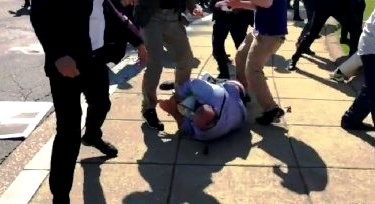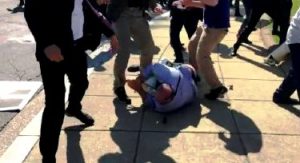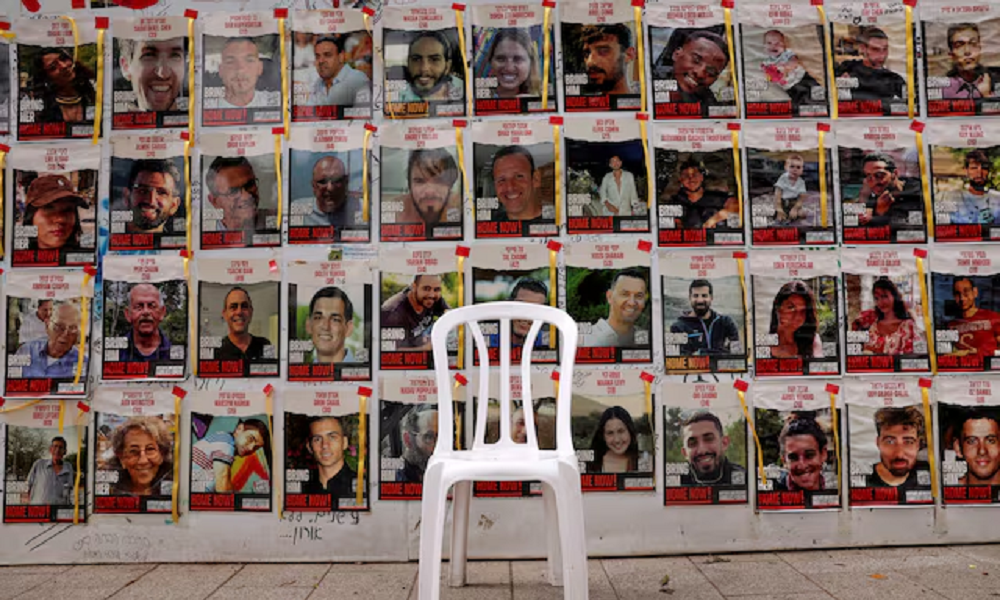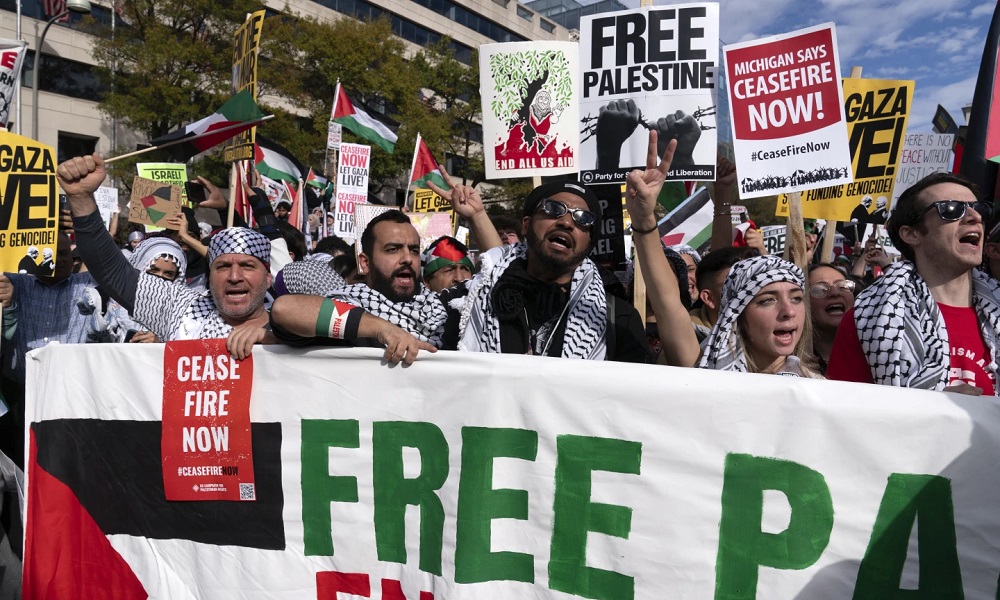World
U.S. decries Washington brawl during Turkish president’s visit

 The United States said on Wednesday it was voicing its “strongest possible” concern to Turkey over a street brawl that erupted between protesters and Turkish security personnel during President Tayyip Erdogan’s visit to Washington, D.C.
The United States said on Wednesday it was voicing its “strongest possible” concern to Turkey over a street brawl that erupted between protesters and Turkish security personnel during President Tayyip Erdogan’s visit to Washington, D.C.
Turkey blamed the violence outside its ambassador’s residence on demonstrators linked to the Kurdistan Workers Party (PKK), but Washington’s police chief called it a “brutal attack” on peaceful protesters.
Police said 11 people were injured, including a Washington police officer, and two people were arrested for assault. At least one of those arrested was a protester.
“We are communicating our concern to the Turkish government in the strongest possible terms,” State Department spokeswoman Heather Nauert said in a statement.
A video posted online showed men in dark suits chasing anti-government protesters and punching and kicking them as police intervened. Two men were bloodied from head wounds as bystanders assisted dazed protesters.
Washington Police Chief Peter Newsham told a news conference on Wednesday police had a good idea of most of the assailants’ identities and were investigating with the Secret Service and State Department.
One of the men arrested, Jalal Kheirabadi, told Reuters he was being beaten by three or four people when a D.C. police officer accused him of assault. He spoke by phone on Wednesday night after he was released pending a June court hearing.
Kheirabadi, 42, of Fairfax, Virginia, said he attended the protest to urge the United States to continue its support for Kurdish forces in Syria. He said he remembered being punched by three or four of Erdogan’s guards and seeing a D.C. police officer fall, but he did not recall hitting the officer.
“He stood up and protected me from them, and then he handcuffed me. He was a real gentleman, I appreciated that,” said Kheirabadi, adding that he immediately apologized to the officer.
Kheirabadi said he has lived in the United States for 13 years with his family, including a young son, and had never been in legal trouble in the United States before his arrest. “I didn’t go there to fight,” he said. “It just happened.”
A charging document for the other man arrested, Ayten Necmi, 49, of Woodside, New York, said peaceful protesters were taunted by a second group of demonstrators who shouted obscenities and taunts at them.
The document said four or five Middle Eastern men in dark suits from the second group assaulted the peaceful protesters. It said about eight people told officers they were attacked, thrown on the ground and stomped.
The Turkish Embassy said in a statement the protesters were affiliated with the outlawed PKK. The group is considered a terrorist group by both Turkey and the United States.
The embassy said Erdogan was in the ambassador’s residence after meeting President Donald Trump, and Turkish-Americans who were there to greet him responded to provocations from PKK-linked protesters.
“The violence and injuries were the result of this unpermitted, provocative demonstration,” the statement said. The claim that protesters were linked to the PKK could not be verified immediately by Reuters.
Tens of thousands of Turks have been detained as Erdogan cracked down on the media and academia following an attempted coup in 2016. Trump made no mention on Tuesday of Erdogan’s record on dissent and free speech.
House of Representatives Foreign Affairs Committee Chairman Ed Royce, a California Republican, called on Attorney General Jeff Sessions and Secretary of State Rex Tillerson “to hold individuals accountable” for the attack.
Washington Mayor Muriel Bowser and five Republican senators, including John McCain of Arizona and Marco Rubio of Florida, also condemned the assault.
Mehmet Tankan, 31, said he was one of a dozen protesters outside the ambassador’s residence chanting anti-Erdogan slogans when the brawl broke out.
Tankan said by telephone seven security personnel, some carrying firearms, rushed up and began punching him, bruising him all over his body.
Tankan said the violence was worse than when Erdogan visited Washington in 2016 and scuffles erupted between his security detail and demonstrators.
“The next time they could kill us easily. I’m scared now too, because I don’t know how it will affect my life here in the United States,” said Tankan, who lives in Arlington, Virginia.
Written by: Reuters

World
Hamas says it received Israel’s response to its ceasefire proposal

Hamas said it had received on Saturday Israel’s official response to its latest ceasefire proposal and will study it before submitting its reply, the group’s deputy Gaza chief said in a statement.
“Hamas has received today the official response of the Zionist occupation to the proposal presented to the Egyptian and the Qatari mediators on April 13,” Khalil Al-Hayya, who is currently based in Qatar, said in a statement published by the group.
After more than six months of war with Israel in Gaza, the negotiations remain deadlocked, with Hamas sticking to its demands that any agreement must end the war.
An Egyptian delegation visited Israel for discussion with Israeli officials on Friday, looking for a way to restart talks to end the conflict and return remaining hostages taken when Hamas fighters stormed into Israeli towns on Oct. 7, an official briefed on the meetings said.
The official, who spoke on condition of anonymity, said Israel had no new proposals to make, although it was willing to consider a limited truce in which 33 hostages would be released by Hamas, instead of the 40 previously under discussion.
On Thursday, the United States and 17 other countries appealed to Hamas to release all of its hostages as a pathway to end the crisis.
Hamas has vowed not to relent to international pressure but in a statement it issued on Friday it said it was “open to any ideas or proposals that take into account the needs and rights of our people”.
However, it stuck to its key demands that Israel has rejected, and criticised the joint statement issued by the U.S and others for not calling for a permanent ceasefire and the withdrawal of Israeli forces from Gaza.
White House national security adviser Jake Sullivan said on Friday he saw fresh momentum in talks to end the war and return the remaining hostages.
Citing two Israeli officials, Axios reported that Israel told the Egyptian mediators on Friday that it was ready to give hostage negotiations “one last chance” to reach a deal with Hamas before moving forward with an invasion of Rafah, the last refuge for around a million Palestinians who fled Israeli forces further north in Gaza earlier in the war.
Meanwhile, in Rafah, Palestinian health officials said an Israeli air strike on a house killed at least five people and wounded others.
Hamas fighters stormed into Israeli towns on Oct. 7, killing 1,200 people and capturing 253 hostages. Israel has sworn to annihilate Hamas in an onslaught that has killed more than 34,000 Palestinians.
World
In Beijing, Blinken meets Xi and raises US concerns about China’s support for Russia

U.S. Secretary of State Antony Blinken raised concerns on Friday about China’s support for Russia’s military, one of the many issues threatening to sour the recent improvement in relations between the world’s biggest economies.
Blinken raised the matter during five-and-a-half hours of talks with China’s top diplomat Wang Yi in Beijing, the latest high-level contact between the countries that have reduced the acrimony that pushed ties to historic lows last year.
The U.S. diplomat is due to wrap up his visit on Friday with little progress on a raft of contentious issues including U.S. complaints about cheap Chinese exports. Instead, both sides are focusing on pragmatic issues like people-to-people exchanges.
“The Secretary discussed concerns about PRC support to the Russian defense industrial base,” U.S. State Department spokesperson Matthew Miller said, adding the two sides also discussed Taiwan, the South China Sea and other flashpoints.
The PRC is short for China’s official name, the People’s Republic of China.
Despite its “no limits” partnership with Moscow, China has steered clear of providing arms for Russia’s war in Ukraine.
But U.S. officials warn its companies are helping the weapons industry with an unprecedented build up that has helped to turn the tide of the war. For example, bigger machine tool imports from China have helped Russia increase its ballistic missile production, they say.
The U.S. officials say such assistance risks hurting the broader bilateral relationship, even as ties stabilise after being hit by then-House Speaker Nancy Pelosi’s visit to Taiwan in 2022 and the U.S. downing of a suspected Chinese surveillance balloon in February 2023.
China has said it has not provided weaponry to any party, adding that it is “not a producer of or party involved in the Ukraine crisis”. However, it says that normal trade between China and Russia should not be interrupted or restricted.
STEADYING THE SHIP
In addition to his talks with Wang, Blinken met Chinese President Xi Jinping, who reiterated Beijing’s concerns that the United States was suppressing its economic development.
“This is a fundamental issue that must be addressed, just like the first button of a shirt that must be put right, in order for the China-U.S. relationship to truly stabilise, improve and move forward,” Xi said.
Earlier, Wang told Blinken that the “giant ship” of the China-U.S. ties had stabilised, “but negative factors in the relationship are still increasing and building.”
Wang also said the U.S. had taken “endless” measures to suppress China’s economy, trade, science and technology, equating such steps to containment.
“And the relationship is facing all kinds of disruptions. China’s legitimate development rights have been unreasonably suppressed and our core interests are facing challenges,” Wang told Blinken.
The agenda for the talks had been set during the November summit between Biden and Xi in San Francisco and a follow-up call in April.
Underscoring the growing discord between the two sides, hours before Blinken landed in China on Wednesday, U.S. President Joe Biden signed a bipartisan bill that included $8 billion to counter China’s military might, as well as billions in defence aid for Taiwan and $61 billion for Ukraine.
Wang said the U.S. must not step on “red lines” covering sovereignty, security and development interests – an apparent reference to Taiwan, the democratically governed island that China claims as its own, and the disputed South China Sea.
Other issues on the table include artificial intelligence and the U.S. push for progress on the curbing of China’s supply of the chemicals used to make fentanyl.
Blinken, along with senior U.S. officials focused on anti-narcotics collaboration with China, met China’s minister of public security, Wang Xiaohong, to discuss the fentanyl issue.
Ahead of Friday’s talks, U.S. Treasury Secretary Janet Yellen signalled that Biden was not taking any options off the table to respond to China’s excess industrial capacity.
Wang said that the U.S. should stop “hyping up” the “false narrative” of China’s overcapacity.
(Reuters)
World
US student protests over Gaza intensify despite arrests

Students at a growing number of U.S. colleges continue to gather in pro-Palestinian encampments with a unified demand that Israel end its war on Gaza and that universities to divest from companies with ties to Israel.
So far, police have arrested hundreds of student protesters at numerous colleges, including the University of Southern California, University of Texas at Austin, and Columbia University in New York, among others.
The growing unrest on college campuses is also accompanied by a rise in antisemitism.
CNN reports that antisemitic acts have surged across America and particularly on campuses since October 7.
Islamophobia has also run rampant.
The recent surge in protests have in turn inflamed tensions, forcing leadership to decide when free speech on campus crosses a line and becomes threatening, CNN reports.
Several colleges have called the police on protesters, leading to the arrests of hundreds across multiple campuses.
On Wednesday, at the University of Texas at Austin, state troopers in riot gear, including some on horseback, began breaking up a group of protesters shortly after a demonstration.
The arrests on Wednesday in cities of Austin and Los Angeles came as students at Harvard University and Brown University on the east coast also defied threats of action and set up encampments in solidarity with Palestinians in Gaza.
Al Jazeera reported that protesters at Columbia University, the epicenter of demonstrations that began last week, said they won’t disperse until the school agrees to cut ties with Israeli universities and commits to divesting funds from Israel-linked entities, among other demands.
Tensions on multiple US campuses were sparked after Hamas’ October 7 attack, where militants killed about 1,200 people and took over 200 hostages. Israel retaliated on Gaza and has over the past six months killed more than 34,000 people.
When did the current conflict start?
CNN reports that the situation escalated last week at Columbia University when the university’s president, Nemat “Minouche” Shafik, testified before a House committee about the school’s response to charges of campus antisemitism. A pro-Palestinian protest kicked off on campus at the same time.
Following her testimony, Shafik requested in a letter released by the university that the New York City Police Department remove people who were encamped on the South Lawn of the campus who were “in violation of the University’s rules and policies” and trespassing.
More than 100 people were arrested.
The encampments were organized by Columbia University Apartheid Divest (CUAD), a student-led coalition of more than 100 organizations, to protest what they describe as the university’s “continued financial investment in corporations that profit from Israeli apartheid, genocide, and military occupation of Palestine.”
Since last Thursday, other college campuses have faced similar protests and encampments, as well as arrests.
Pro-Palestinian encampments have been set up at the Massachusetts Institute of Technology, Emerson College, the University of Texas at Austin, the University of Michigan and the University of California, Berkeley. On Wednesday, police arrested nearly 100 protesters at the University of Southern California after a dispersal order.
Yale University police arrested at least 45 protesters Monday while Harvard University closed Harvard Yard and officials at the school suspended a pro-Palestinian student organization for allegedly violating school policies, CNN reported.
-

 Latest News4 days ago
Latest News4 days agoRashid Khan named AWCC’s brand ambassador
-

 World4 days ago
World4 days agoMalaysian navy helicopters collide in mid-air, 10 killed
-

 Sport4 days ago
Sport4 days agoJaiswal ton powers Rajasthan to big IPL win
-

 World4 days ago
World4 days agoNorth Korea officials visit Iran in a rare public trip
-

 Latest News5 days ago
Latest News5 days agoAt least 1,500 families affected by recent floods: IRW
-

 Sport5 days ago
Sport5 days agoMawj Sahil player scores stunning halfway line goal in 1-0 win over Jawanan Wahedi
-

 Sport3 days ago
Sport3 days ago‘Serious talent’ Fraser-McGurk bonds with Warner to light up IPL
-

 Latest News4 days ago
Latest News4 days agoUS report cites ‘significant deterioration’ in Afghan women’s rights last year














